The Motorcycle Portraits is a project by photographer/filmmaker David Goldman, who travels the world making documentaries, and takes time out to interview interesting people in the motorcycle scene, wherever he might be. The result is a single exemplary photo, a geolocation of his subject, and a transcribed interview. The audio of his interviews can be found on The Motorcycle Portraits website.
The following is a double-portrait session, with Vikki and Dutch Van Someren, the co-founders of the Bike Sheds in London and Los Angeles, which have become important ‘neutral ground’ for motorcyclists of all types and inclinations. The Bike Sheds feature a great restaurant and bar, barber and tattoo shops, a motorcycle and gear emporium, plus even spaces, all of which is surrounded by very cool custom and vintage motorcycles on display and/or for sale. David Goldman caught up with Dutch and Vikki at the Bike Shed in Los Angeles on February 15 2023, and asked them a few questions about motorcycling: the following are their responses, wtih Vikki taking the lead.
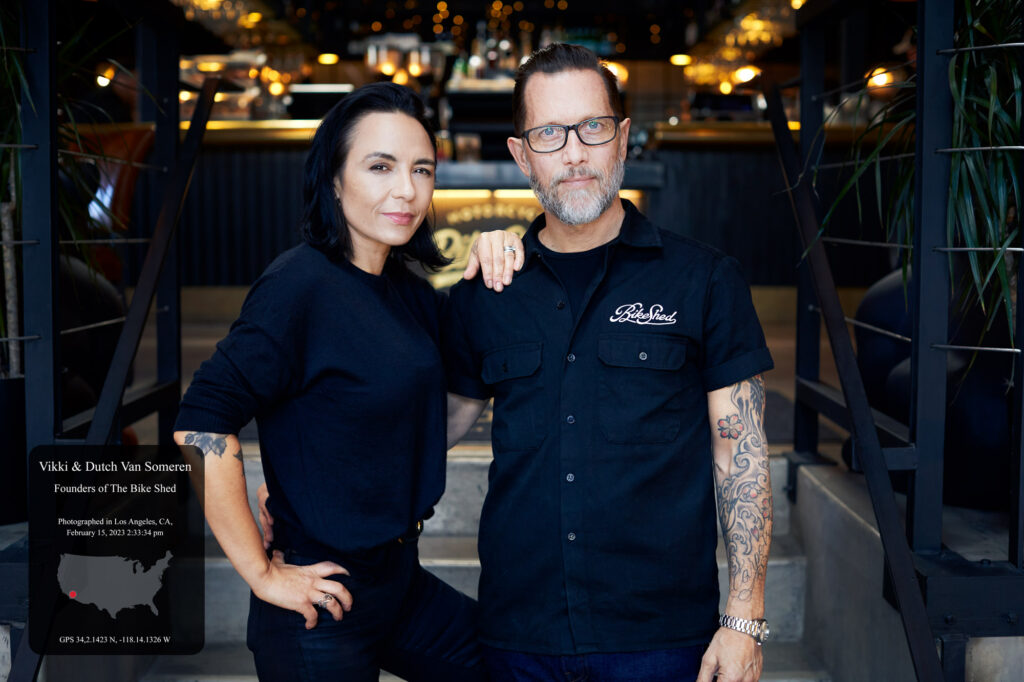
Please introduce yourself:
My name is Vicky Van Someren and I’m the co-founder of Bike Shed and we are currently sat in LA enjoying the sunshine.
How did you first get into motorcycles?
How I got into biking was when I was a kid. I was bought a little 50cc Honda because my stepdad used to ride and build bikes. He had an old Matchless and we used to watch him riding in the woods and crashing it all the time. So yeah, that was how I got into it.
What is a great experience or memory that you have that is directly related to motorcycles?
So a great experience I’ve had that directly aligns with motorcycling was really about the BikeShed community response. A friend contacted me, I hadn’t spoken to her for a few years and she was like, you know lots of people, my mum and dad are recovering from cancer, they live in the middle of nowhere, we can’t travel because there was a travel ban and they need food and they can’t go out. So I reached out to some of our members and I was thinking there must be loads of people out there that need help but can’t get any. I reached out to a few members and between us all we created the BikeShed Community Response and we delivered food for over 22 months, over 30,000 deliveries.
But the thing that really got me was not only we were helping save other people’s lives, the riders were saying that we helped them save their lives and finally they had some purpose during COVID. But also we got contacted by a lady and sadly her partner died riding his bike and she thanked us for giving him the last month of his life a great purpose and he was the happiest he’d been for a long time.
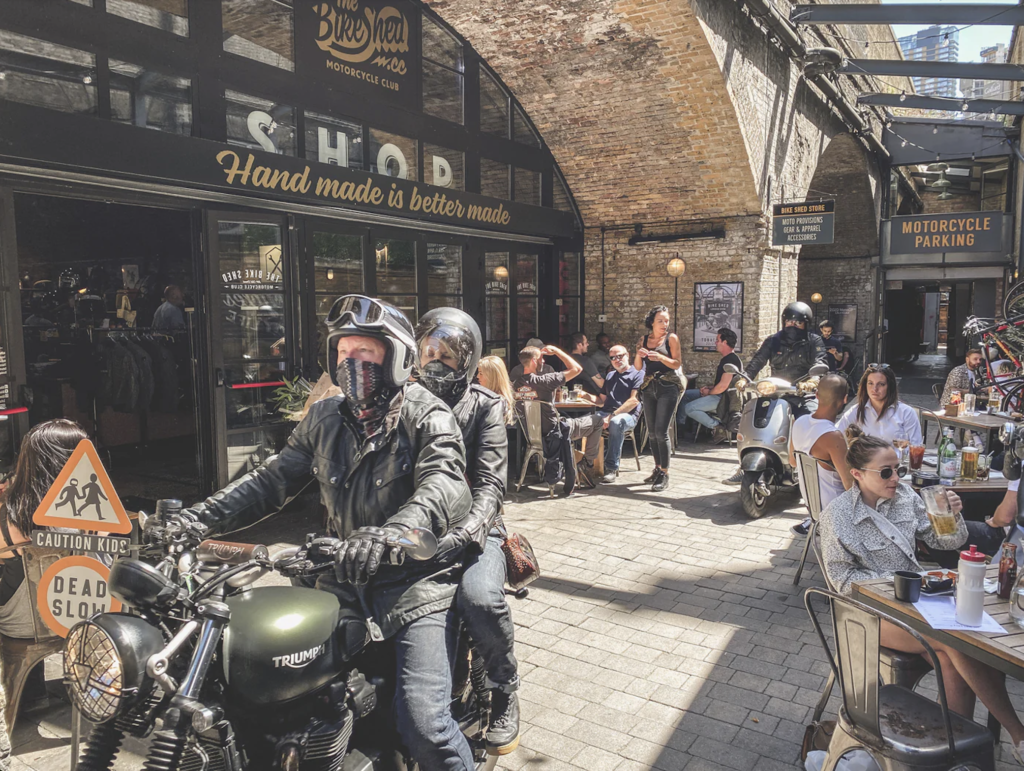
What does motorcycling mean to you?
Really for me it’s about the common ground, it’s about the fact that it’s the thing that brings people together instead of – in this crazy world – that pushes people apart. It’s about the freedom you feel, it doesn’t matter what sex you are, who you are, when you’re on your bike, and with the road, you are one.
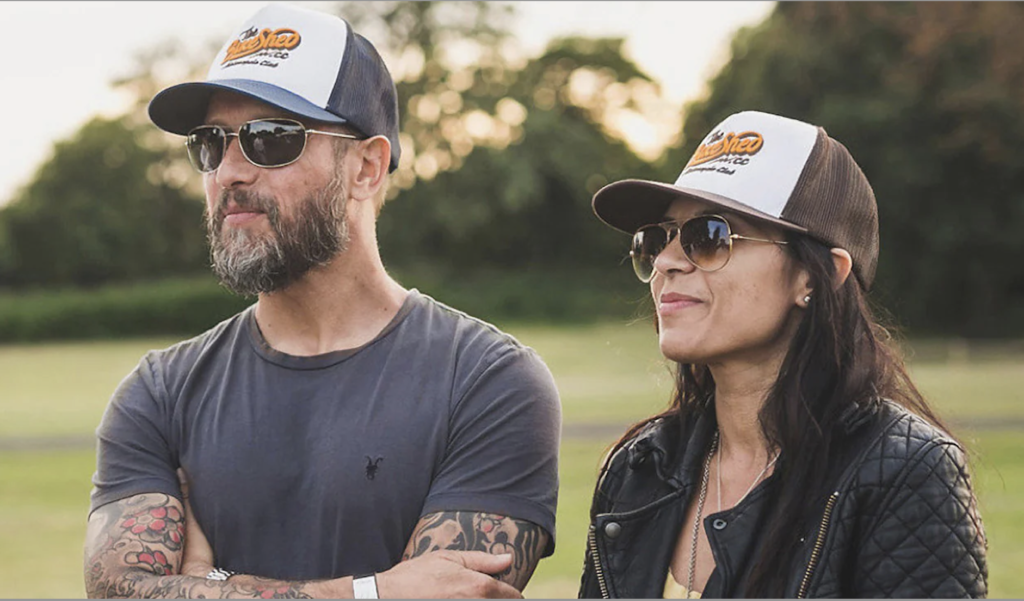
Please introduce yourself:
Hi, my name is Anthony ‘Dutch’ van Someren. I’m here in LA at the LA bike Shed moto destination. I’ve been riding motorcycles since I was 17 years old. Soon as I was allowed to, as soon as that was a thing that I was old enough to do. I’m the co- founder and co-owner of Bike Shed Motorcycle Club in London and in Los Angeles. We’ve been open here in LA now since April last year. So it’s been a minute really enjoying the warm welcome and the warm sunshine.
How did you get started:
So when I was 16 or 17, if you wanted to go anywhere, you bought a motorcycle. Back in the 70s you didn’t just buy a car. I grew up in Sussex, outside London. And and you know, it was kind of fairly populated, but it’s the countryside, the countryside with big towns. And if you wanted to go to the pub or see your girlfriend or see your friends, if you didn’t want to walk or cycle or take the bus, you bought a motorcycle. And it was the era of the trail bikes that looked like motocross bikes. So my first motorcycle was a Suzuki TS125X look just like an RM250. I thought that was awesome. And I had a whole bunch of friends who are a little older than me because I was in a punk rock band. They were the grown up older punks, I was the young new punk, they all rode dirt bikes. And they dragged me from destination to destination from pub to club, we’d ride to Brighton, we’d ride to London, we would take our bikes on military testing grounds for testing tanks, and get chased by the military police. But yeah, what really got me into it was that freedom, that ability to travel and get around. But obviously the motorcycle was also an accessory. It’s part of who you are. It defines how you’re dressed that day, and what you can take with you. And so it turned very quickly from being transport into culture and into lifestyle, and into a big piece of who I am.

What is a great story or experience that you can attribute to Motorcycles?
What I really love about motorcycles is the stories and the adventures they create, but also the way they bring people together and the kind of humanity you see amongst riders, because for me, motorcycle riders, they’re a little bit different from everybody else. And we talk about common ground, and we talk about leaving your differences at the door. But often you see even deeper than that; you see into humans and human nature. We have a club, but you don’t have to join, we always say we’re kind of ‘exclusively non-exclusive.’ But one of the things that I really think about this culture, and what we’re trying to continue to create and encourage. Our membership had a big ride out to Wales, out in the country on adventure bikes, you know, riding through trails and green-laning. You know – soft off-road road riding. And there was about a dozen guys led by Dan, who runs our memberships. And one of the guys had been really unwell for a long time, he was recovering getting back to health. And he was like, ‘Look, I’m, I’m kind of pretty weak, and I get tired quite easily.’ And the whole of the group were like, ‘don’t worry about it, you know, if you’re tired, if you’re struggling, you know, we’ll take care of you.’ But he was doing pretty well. And they were riding through Wales, and it was foggy, and kind of that misty kind of rain. And he was lagging further and further behind. And Dan was at the back looking after him. And after a while, he just pulled the bike over and stopped. And he said, ‘Look, I’m so tired. I can’t go on.’ And they had a destination to get to everybody was waiting to get back to this kind of little bed and breakfast that they were all staying at and looking forward to drinking beers and telling stories about the day. Dan answered, ‘Look, don’t worry, just sit by the road. Let’s just get your energy back.’ So they sat by the road for like an hour, maybe a couple of hours while he got his energy back. And Dan was saying, ‘Look, if you want, I’ll take you on the back of my bike, and we’ll pick your bike up later. Don’t worry about it. We’ll just get you to the bed and breakfast.’ And he was like, ‘no, no, I think I can get on the bike.’ So they started to continue down the road. And then they got to the first junction. And there’s one of the members waiting right there on the corner. The backmarker. And they were like, ‘Dude, you’re still here.’ And he goes, ‘Yeah, well, I’m not going to leave anyone behind.’ So he was waiting, and they picked him up, and they got to the next junction. There’s another guy there waiting. Then they get to the next junction. There’s another guy with they’re waiting, every single member stopped and waited. And I guess everybody knows the rules. That’s what you’re supposed to do. But Dan kind of assumed, because everybody’s got each other on the GPS, and everyone was just going back to the hotel. No one wanted to leave. And the guy was transformed from that experience. And he said, ‘Now I really understand what this club is all about. Now I understand what bike riders are all about.’ And you know that the club isn’t some brotherhood, we’re a bunch of people that like motorcycles, but it really showed me the caliber of human and how far they go when it comes to looking after their fellow riders.
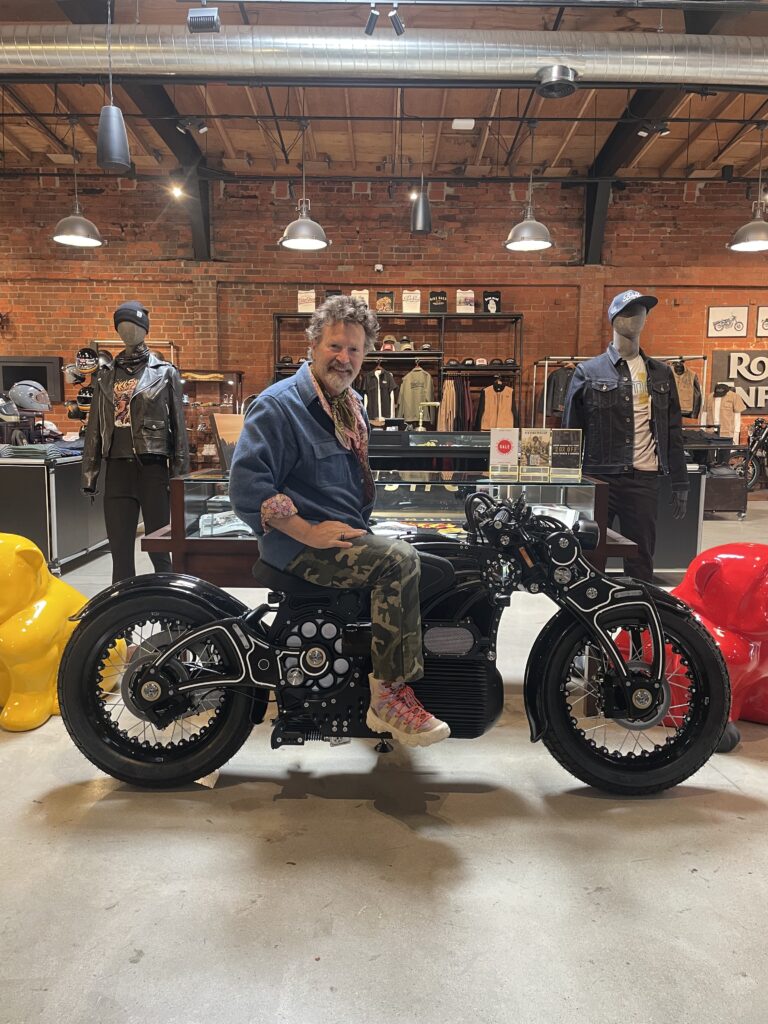
What do motorcycles mean to you?
Motorcycles mean a lot of things to me. And that’s changed through time: when I was a teenager, it was freedom. Freedom to go where I wanted on my own agenda and my own timescale, and I’ve always carried that through with me. That’s a common thread; having the idea that you can always get on your motorcycle and go somewhere. I mean, even a few years ago, when they had the terrorist attacks in London, and public transport came to a close, I knew I could get anywhere on a motorcycle. You know if my wife needed me I could get to wherever she was. If my kids needed me, I could get on a bike and I could get there. And it didn’t really matter what else was going on. It’s kind of the ultimate utilitarian get-there vehicle. And we had that as well in the Bike Shed Community Response during COVID. We used our members and our customers as a network of couriers, and we were delivering PPE and food and equipment. We were the first people to deliver COVID tests on behalf of the National Health Service in the UK. And they trialed it with us. And we deliver tests to surgeons to see that they didn’t have COVID. So they could go to work that day and do their surgeries. For me, there’s always been that element of this kind of freedom. I’ve got this bike, as long as it’s fueled up, and I’ve got the keys and the batteries charge, no one’s going to stop me going anywhere.
The second thing that has really come to me over time is escape. Because in a world that’s really interruptive, and digital, and your phone’s always beeping and going off and people expect to have access to you all the time. When you put that helmet on, and you start your bike up and you get on the road, no one can get to you. And I love the feeling of hearing my mobile phone vibrating in my pocket and going no, no, I’m on a motorcycle. I’m not going to get that. I’m going to leave that and you really do leave all your troubles behind. And it really is this mindful in-the-moment experience where no one can get to you.
And in the last 10 years, it’s also been my business, my life, my passion. You know, opening Bike Shed was all around motorcycles and motorcycle culture. And I also love them as art objects and as engineering and as design. You know, I’m an aesthetic person, and I love toys. And for me, motorcycles are still the ultimate mix of design and mechanics and experience. So there are a whole bunch of things: a metaphor for freedom, and a metaphor for analog in a digital world, and real experiences in a virtual world, where most things are fake. Motorcycles and motorcycle people are not fake.
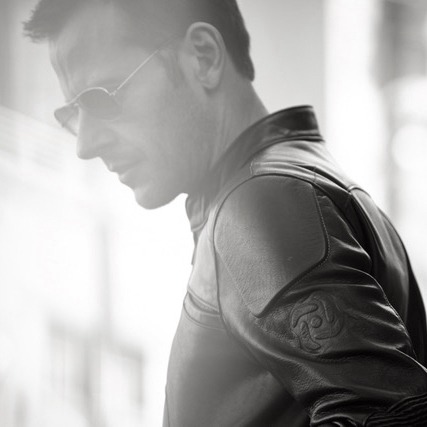

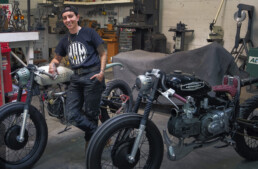
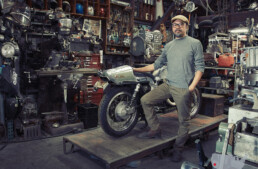
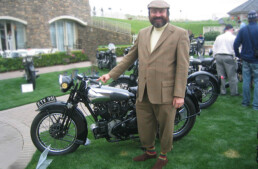
I’ve always wondered how these two fared … seems like pretty OK .
…Not my kind of place though … not being the One Stop Shop kind of a guy …. as I’ve said before … if visiting LA … I’d be getting tattooed by Dr Woo ( where I could also get some fantastic room service if so inclined …. not to mention some good digs fer the stay ) …. grabbing some grub at multiple venues … if its bikes I wanna be around … just as one example … I’d be paying Sensei Kimura a visit … And clothing ? Hell …. there’s more choices than I’d have time for .
Oh well … some of us ( moi included ) are in it to fate adventure … whilst too many of us are in it for the convenience … regardless of the compromises involved …. sigh … such is the zeitgeist of the Hipster wanna be SnowFlake generation .
Sigh … if they only knew ……….. but they never will …snicker snicker ( schadenfreude at its finest )
😎